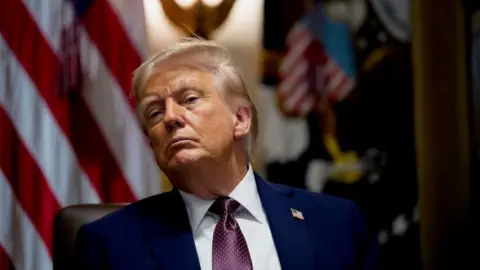ARTICLE AD BOX
Anthony ZurcherNorth America correspondent
Watch: Epstein survivors speak publicly outside US Capitol
If Republican leaders in Washington had hoped that a month-long congressional recess would help the Jeffrey Epstein controversy die down, this week's frenzy of activity has dashed those hopes - at least for now.
Last Friday, the Justice Department released more than 33,000 pages of documents related to its Epstein investigation into child sex trafficking. By Monday, a consensus had formed that most of the information was already publicly available or of little interest.
Early in the week, Republican Thomas Massie of Kentucky and Democrat Ro Khanna of California resumed their efforts to gather support for a "discharge petition" in the House of Representatives that would force a vote on publicly releasing the entirety of the government's Epstein case information.
On Wednesday, a group of Epstein victims and their families held a press conference on the steps of the Capitol to support the discharge petition and call for full disclosure in the Epstein case.
Taken together, it's the kind of drumbeat of attention that has helped the story break into the larger public's awareness. But will it stay there? Here are possible scenarios for what happens next.

 Getty Images
Getty Images
The heat on Trump rises
The victims' press conference could mark a dramatic turn in the Epstein saga.
Missing from the Washington dialogue, which had focused on client lists and the possible involvement of the rich and powerful, were the faces of those whose lives were damaged or destroyed as children by Epstein's crimes.
The gathering at the Capitol on Wednesday put those victims front and centre - with an added promise that they would not be silenced.
Donald Trump has for months tried to brush off the criticisms of his administration's handling of the Epstein case as a "hoax" perpetrated by his political enemies.
That strategy, while effective in the past, is becoming harder in this case.
And if Massie and Khanna succeed in forcing a House vote to publicly release all remaining Epstein files - and there is new, politically damaging information in them involving Trump or other high-profile political figures - the dam could break.
The White House has denied a Wall Street Journal report that Trump was told in May by his attorney general that his name appeared in files related to the investigations against Epstein, who took his own life in prison awaiting trial.
He was friends with Epstein in the 1990s and early 2000s, but being named is not evidence of any criminal activity. Trump has never been accused by investigators of wrongdoing in connection with the Epstein matter.
Even if there no "client list" of the Epstein's rich and powerful comes to light, the victims may will one into existence. They've promised to gather the names of those they said had close ties to Epstein and were connected to his misdeeds.
"I'm not afraid to name names," said Majorie Taylor Green of Georgia, one of the Republican members of Congress and usually a Trump loyalist. "And so if they want to give me a list, I will walk in that Capitol on the House floor and I'll say every damn name that abused these women."
These are the kind of ingredients that could fan the flames in the Epstein story as summer turns to autumn.
It rumbles on but little damage
Maybe there's nothing new in any new Epstein-related documents that make it into the public domain. Or maybe the congressional efforts to force public disclosure fall just short. Even with the victims and their families becoming more visible, new revelations or information are what drive news cycles and substantively move public opinion.
In this scenario, the Epstein story doesn't go away completely but it never becomes the kind of crisis that causes lasting political damage to the Trump administration. It is a distraction, not a disruption.
As the Republican Party prepares for midterm congressional elections next year that are shaping up to be closely contested, even a modest drag on their public approval - a diversion that keeps them from focusing on a more beneficial campaign message - could have significant ballot-box consequences.
As Trump pointed out on Tuesday, it's hard to squash a conspiracy theory. He drew parallels to the 1963 assassination of John F Kennedy and his recent orders to release more government documents.
"You know it reminds me a little of the Kennedy situation," he said. "We gave them everything over and over again, more and more and more and nobody is satisfied."
Trump will be more familiar with the recent conspiracy around former President Barack Obama's birthplace. The White House released short- and long-form certificates showing Obama was born on US soil but doubters, most notably Trump himself, were never satisfied.
Turnabout, as they say, is fair play.
Fade to black, scandal subsides
If there's one undeniable power that Trump has shown over his 10 years in the national political spotlight, it's the ability to outlast every scandal and controversy that comes his way. While the Epstein story has a toxic blend of power, abuse, sex and influence, there's no indication that this will be any different.
"He's done it before, and he will do it again" is the mantra that a White House looking for a best-case scenario might want to repeat. Without new revelations, the public will eventually tire of this story - or it will be buried by a new scandal, conflict or media frenzy.
If so, the Epstein saga will return to corners of the internet and the political fringes, joining the Kennedy assassination, US moon landing and, yes, Obama's birth certificate as the focus of only an obsessed few.
It may not be justice - it may be too late for that - but it would not be an unfamiliar ending in modern American politics.

 4 hours ago
7
4 hours ago
7








 English (US) ·
English (US) ·